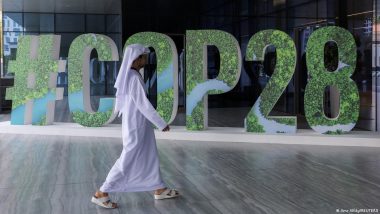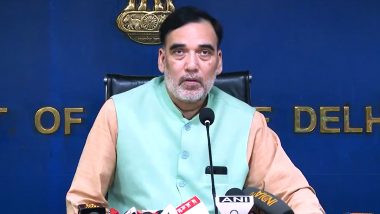After a year of record temperatures, deadly floods and devastating wildfires, oil giant UAE is hosting world leaders Dubai in the annual UN summit to stave off climate catastrophe.The annual UN summit aimed at averting climate disaster kicks off this week, with the oil-rich United Arab Emirates hosting the talks.
The choice of the host nation for the 28th climate negotiations proved controversial, as did the decision to appoint Sultan al Jabar, UAE's Minister of Industry and Advanced Technology and CEO of the Abu Dhabi National Oil Company, to preside over them
Also Read | World News | Vice President Harris Will Attend COP28 Climate Conference in Dubai.
While world leaders welcomed the appointment of the fossil fuel executive — US climate envoy John Kerry called him a "terrific choice" — many politicians and environmental groups were outraged. More than 130 EU and US lawmakers signed a public letter, saying his presidency "risks undermining negotiations."
Discussions at COP28 will span everything from tackling agricultural emissions and food security to how countries can adapt to weather extremes as we heat the planet by burning fossil fuels.
But three key issues are set to dominate talks: climate financing for vulnerable countries, bolstering emissions cuts pledges and phasing out fossil fuels.
What's next for the loss and damage fund?
A "loss and damage" fund for low-income countries hit by extreme weather had long been resisted by wealthy, high-polluting nations who feared being on the hook for vast sums of money. One 2018 study estimated losses from climate change could cost vulnerable nations between $290 billion and $580 billion by 2030.
Harjeet Singh, head of global political strategy at the Bonn-headquartered Climate Action Network (CAN), told DW that developing countries most vulnerable to the consequences of planetary heating have done little to contribute to the fossil fuel emissions causing climate change.
"Who bears the most responsibility?" said Singh, "It's rich countries who have put close to 80% of greenhouse gas emissions into the atmosphere, which is responsible for the climate crisis."
But last year at COP27, delegates reached a major breakthrough, agreeing to establish a fund to help developing countries recover after weather disasters. Delegates in Dubai will have to agree on the finer sticking points like which states will be able to access the fund, who will pay how much into it and how will it be administered.
Ahead of the talks, a transitional committee of representatives from developing and developed nations drafted recommendations to answer those questions. The highly charged discussions failed several times before producing a tentative agreement proposing the World Bank host the fund in the interim.
This is seen as a major concession by developing nations who fear the institution would give richer nations more influence.
The committee also recommended against the contentious idea of making payments legally binding, instead urging developed countries to contribute to the fund.
"We are extremely concerned as civil society because we don't find those recommendations very strong, particularly holding the developed countries to account to pay for the loss and damage," said Singh.
Tracking country climate pledges
In 2015, nearly 200 governments signed the historic Paris Agreement, a legally binding treaty with the goal of keeping global temperature rise to well below 2 degrees Celcius (3.6 degrees Fahrenheit) compared to pre-industrial levels. So far average temperatures have increased 1.2 C, with 2023 on track to be the hottest ever recorded.
This year, the COP will see the first-ever "global stocktake" or review of each country's progress in slashing emissions to meet the heating pledge.
"It's about looking at what has been achieved, where the gaps are and what more needs to be done," said Singh. "It's a process to respond to scientific findings."
The stocktake, which started in 2021, involved collecting and analyzing data on governments' climate action plans, emissions cuts and adaptation efforts. That was bundled into a UN report published in September with a stark warning for the planet — and COP delegates — that countries are way off track and the timeframe left to secure a "liveable planet is rapidly closing."
At COP28, states and businesses will have to up their game to rapidly decarbonize, the report said. Increasing ambition on emissions cuts will be high on the agenda.
Phasing out fossil fuels
Though governments have long known they are fueling climate change by burning coal, oil and gas, many have no intention of stopping. In fact, a new UN report found petrostates are planning huge expansions that would blow the world's carbon budget and throw "humanity's future into question."
COP delegates have never officially committed to stop using fossil fuels. They were only mentioned for the first time in official decisions at COP26 in Glasgow when governments agreed to "phase down" coal, shying away from a full phase-out.
The amount of coal being burned continued to rise even after the pledge. Last year, delegates failed to call for all fossil fuels to be phased out despite a coalition of around 80 countries pushing for it.
Still, some campaigners are optimistic that new recommendations in the September global stocktake report will put the issue on the COP28 agenda. The UN report called for the scaling up of "renewable energy while phasing out all unabated fossil fuels."
Romain Ioualalen of the advocacy organization Oil Change International said it showed how much the dial had moved on the topic.
"Even a few years ago, it was unthinkable to have a decision on fossil fuel phase-out at COP because of the influence of oil and gas producing countries," he told DW.
There is likely to be severe push-back at the summit, however, given that oil and gas producers, like COP 28 host UAE, are so resistant. Mariam Almheiri, the country's climate minister, told the news agency Reuters that such a move would hurt producing countries reliant on fossil fuels for revenue.
But failing to agree on a phase-out will harm the summit's credibility, said Ioualalen.
"People will start asking questions about why are we still meeting if we can't get an agreement on what's actually driving the problem we're trying to solve," he said. "It will also signal to the oil and gas industry that governments are not serious about the transition."
Despite the problems, Ioualalen and other activists believe the summit is worthwhile.
"You won't find any other process in the diplomatic space where a country with 50 or 100,000 people can stand up to the United States and China and call them out for their lack of ambition on climate change," said Ioualalen. "It's flawed, but it's still deeply precious."
Edited by: Tamsin Walker, Jennifer Collins
(The above story first appeared on LatestLY on Nov 30, 2023 03:00 AM IST. For more news and updates on politics, world, sports, entertainment and lifestyle, log on to our website latestly.com).













 Quickly
Quickly



















